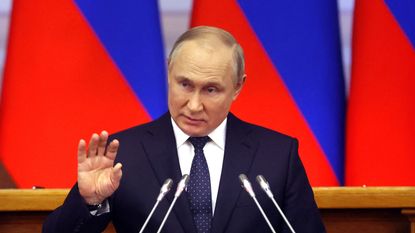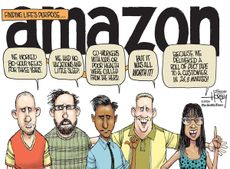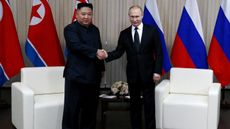‘Negotiation with Putin would be a moral disaster’
Your digest of analysis from the British and international press

1. Now is not the time to seek a deal with Putin
The Washington Post editorial board
On weapons not talks
“Wars end,” says The Washington Post. “Many, if not most, end with negotiation. That might be what happens with the war Russia launched against Ukraine.” However, “it would be a disaster – both moral and strategic – if Mr. Putin were invited to talks before his major war objectives had been thwarted”. Pressure for talks “remains a minority view within the Western alliance, and it should be”. “Nato’s red lines, public and private, seem to be holding” and Putin shows “no signs of interest in a deal” as opposed to the “outright seizure of all Ukraine”. A negotiated settlement may become an option. “For now, though, the best way for Ukraine’s friends to help is to accelerate shipments of vital weaponry – and stop negotiating with themselves.”
Subscribe to The Week
Escape your echo chamber. Get the facts behind the news, plus analysis from multiple perspectives.

Sign up for The Week's Free Newsletters
From our morning news briefing to a weekly Good News Newsletter, get the best of The Week delivered directly to your inbox.
From our morning news briefing to a weekly Good News Newsletter, get the best of The Week delivered directly to your inbox.
2. Sunak’s splurge will buy him only six months
James Forsyth in The Times
On the wolf at the door
The question about Rishi Sunak’s support package is “whether it is generous enough to hold off demands for more money”, says James Forsyth in The Times. There is a recognition among cabinet ministers that, “come the budget in October, the government will have to do more”. The scale of the chancellor’s measures surprised many but his £15bn “will really only keep the wolf from the door. This living-standards crisis will go on long enough that it won’t be the final intervention that ministers will have to make.” During the Covid pandemic, “the government had the benefit of the doubt as it responded to the crisis”. But “this crisis is very different” as “ministers have little political capital in the bank”. Therefore, “any hope of a Tory revival rests on a sense that the government steered households and the country through the coming economic storm”.
3. The endless tiny errors of the NHS
Charles Moore in The Spectator
On aggregate anger
Jeremy Hunt has written a “good new book examining unnecessary deaths in the NHS”, says Charles Moore in The Spectator. But “someone should write a companion volume about the other end of the scale of seriousness – the literally millions of small mistakes and obstructions effected by ‘the envy of the world’”. Since 2014, Moore has made dozens of visits to eight different NHS hospitals. And “almost every encounter has been strewn with error or delay”. This includes “immense waits in A&E, postponement of operations, the loss or muddling of medical notes or X-rays, the cancellation of appointments, non-emergency moves to another hospital conducted in the small hours” and “being asked the same questions again and again by different staff”. When you see all this “in aggregate”, he says, “you cannot avoid being angry”.
4. Stranger Things has redefined what it means to be a ‘nerd’
Harriet Williamson in The Independent
On intrigue and enchantment
As Stranger Things returns to Netflix with its fourth season, Harriet Williamson feels “the time has come to celebrate the beating heart” of the show. “Central to the magic of Stranger Things is fantasy tabletop game Dungeons & Dragons,” she says. The 1970s role playing game is about “imagination and creativity on a grand scale, mixed with plenty of puzzle solving, cooperation, collaboration, strategy and humour”. Dungeons & Dragons can act as a “much-needed reset”, she says, “allowing you to become someone else and immerse yourself in a world of intrigue and enchantment” where “there’s no Partygate” and where “Boris Johnson doesn’t exist”. It’s a “joyful, creative and inclusive experience, and I recommend it to anyone, however familiar with or disconnected from wider ‘nerd culture’ they might feel”.
5. Why is TalkTV failing?
Ben Sixsmith on The Critic
On a limited launch
Ben Sixsmith says he agrees with “a lot of the sentiments expressed by the presenters of TalkTV”. But, having watched the channel, he writes: “I don’t feel angry anymore. I feel numb inside. Cold. Hard. Dead.” The “one-note grumbling doesn’t motivate me to care about these issues”, he says on The Critic. “Somehow, such monotonous boomer bait has the opposite effect. Without the subtle tastes and textures of insight, humour, mystery and eloquence, I feel a bit like I am eating an enormous vat of unflavoured porridge.” Sixsmith finds it “perversely admirable” how presenter Piers Morgan “has had such success with so little talent”. Turning the screw on the host, Sixsmith writes: “Humour? Charm? Eloquence? All of them are alien to a man for whom God, in His wisdom, decided to exhaust his supplies of aimless belligerence.”
Create an account with the same email registered to your subscription to unlock access.
Sign up for Today's Best Articles in your inbox
A free daily email with the biggest news stories of the day – and the best features from TheWeek.com
-
 'Republicans want to silence Israel's opponents'
'Republicans want to silence Israel's opponents'Instant Opinion Opinion, comment and editorials of the day
By Harold Maass, The Week US Published
-
 Poland, Germany nab alleged anti-Ukraine spies
Poland, Germany nab alleged anti-Ukraine spiesSpeed Read A man was arrested over a supposed Russian plot to kill Ukrainian President Zelenskyy
By Peter Weber, The Week US Published
-
 Today's political cartoons - April 19, 2024
Today's political cartoons - April 19, 2024Cartoons Friday's cartoons - priority delivery, USPS on fire, and more
By The Week US Published
-
 Would North Korean weapons tilt the war Russia’s way?
Would North Korean weapons tilt the war Russia’s way?Today's Big Question Putin wants to boost ‘depleted stocks’ but Pyongyang’s arms may be in poor condition
By Chas Newkey-Burden Published
-
 Robotyne: does liberated village signal success of Ukraine counter-offensive?
Robotyne: does liberated village signal success of Ukraine counter-offensive?Today's Big Question Russia deploys crack paratroopers to try to stall key Ukrainian advances
By Arion McNicoll Published
-
 Captain Tom charity closes to donations amid daughter’s pool row
Captain Tom charity closes to donations amid daughter’s pool rowSpeed Read Hannah Ingram-Moore to appeal council order to demolish spa complex at her home
By Arion McNicoll Published
-
 How fruitful was Zelenskyy’s European tour?
How fruitful was Zelenskyy’s European tour?Today's Big Question Ukraine’s president visits Rome, Berlin, UK and Paris in bid to increase the supply of weapons from allies
By The Week Staff Published
-
 Downing Street won’t rule out alien invasion
Downing Street won’t rule out alien invasionfeature And other stories from the stranger side of life
By Chas Newkey-Burden Published
-
 The Week Unwrapped: Sex and health, the Earth’s core and another new year
The Week Unwrapped: Sex and health, the Earth’s core and another new yearpodcast Is the NHS failing British women? What’s going on at the centre of our planet? And what’s in a date?
By The Week Staff Published
-
 National nursing strike: should the patient ‘always come first’?
National nursing strike: should the patient ‘always come first’?Talking Point Recent YouGov poll found that 65% of public approves of strike action
By The Week Staff Published
-
 The liberation of Kherson: an opportunity for peace?
The liberation of Kherson: an opportunity for peace?feature Retaking of southern port city would be a major strategic and symbolic win for Kyiv
By Sorcha Bradley Last updated